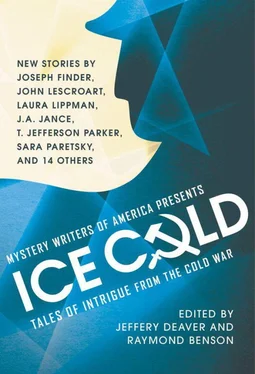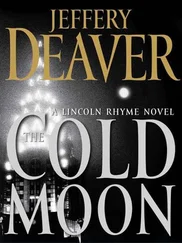And then I remember. The woods, the forest, the desert, the drainage ditch.
I yank open the back gate and run to the flood control channel. I hear Dr. Lamm behind me. At the edge of the channel I see the trickle of water at the very bottom. And in the faint patio lights from my house I can see the still-dripping footprints—just one pair—leading up the opposite side of the concrete canal toward the orange grove. In a blink I’m down the near bank and through the little stream and up the far side. When I get to the grove the light is too dim for footprints so I have to go right or left and I choose right because I always do, automatically, I always choose right because I’m right-handed, and because Dad and Mom choose right, the right wing, because the right leads to freedom and liberty but the left leads to communism and death. I run a few yards then stop. I hear footsteps behind me and turn to see Dr. Lamm catching up.
Suddenly, back in the trees, Marie is screaming. It’s more of a snarl—a throttled grunt made while biting or tearing with your teeth, though her two front top teeth are missing. She has a ferocious temper. The trees are dark, the oranges just faint dabs of color. The earth of the grove is big-clodded and firm. I run toward her like in a dream—slowly, laboring so hard but moving so little. Some fool inside me thinks: this is a dream. Wake up. Wake up!
Marie has stopped screaming. But I see them, Larkin Lamm crouching with his back to me, wrenching her wrists, pushing her against the trunk of a big orange tree, pulling her back, slamming again. I hear her breathless huffs. It takes time to get there. Minutes. Hours. But some dreams come true some days, and mine comes true that day. I jump up and drop my arms around Larkin Lamm’s neck and choke him as hard as any sixteen-year-old has ever choked another person in the history of this Earth.
He’s strong. He stands, but I stay on. He tries locking his hands on my arms then pulling on my hair but I can feel the start of his panic. He spins away from Marie and crashes me into another tree trunk. The same fireflies buzz my eyes as when I held onto the bottom of the ocean while the wave went over me. I do not let go. I will not let go. Then Larkin straightens and jumps and lands on his back, crushing me between himself and the ground. Lights out. I’m gone, completely.
But just for a second or two. I open my eyes to Larkin above me, his hands outstretched. He’s moving backwards, like a lunging dog held by a leash. I roll away and get to my hands and knees and I see the belt around his neck, and Dr. Lamm, holding on with both hands, arms taut and legs braced, pulling Larkin back.
Marie runs up behind me, grunts, and a good-sized rock sails past Larkin’s head, barely missing Dr. Lamm. Larkin gags and tries to get his fingers under the belt. “I am responsible!” calls out the doctor. “I… take… full…” Marie’s next rock hits Larkin smack in the middle of the forehead and a spurt of black blood appears.
When I look back I see our patio lights still on and the open gate and flashlight beams crisscrossing in the darkness toward us. Then voices: Dad’s and Mom’s, higher-pitched than usual, voices calling out for Marie and me, voices full of fear and hope. Dr. Lamm has gotten the belt into a branched “V” of a tree trunk and he’s pulling hard. Larkin stands levered against the tree, arms in a reverse hug of it, his head raised in order to draw breath. His face is smeared with blood and tears, and his gray eyes are calm as always, and, as always, unblinking. Marie throws her small light body against me and I lift her and trudge back toward the light.
THE EVERYDAY HOUSEWIFE
BY LAURA LIPPMAN
The summer that she was a newlywed, Judith Monaghan watched The Newlywed Game almost every day, except when it was preempted by the hearings. She watched those, too, marveling at Senator Ervin’s eyebrows and Maureen “Mo” Dean’s outfits, but she preferred The Newlywed Game , despite the fact that she had once been vitally interested in politics. Actually, maybe that was why she preferred the game show to the hearings; it seemed more real to her.
The Newlywed Game came on at 2 p.m. on Channel 13, and Judith set aside the next two hours to accomplish whatever could be done while seated in the living room—darning socks, shelling peas, whipping in hems, teaching herself to knit. She was sure that she and Patrick could answer every question correctly, as they had known each other for six years before they married. But how would they get to California from Baltimore? Would her mother be upset about the inevitable “Making Whoopee” questions? And was it possible to angle to be on the show when the top prize was a washer-dryer? Judith didn’t like the look of the furniture sets given away as prizes—too shiny new for her tastes—and the Monaghans already had a perfectly good television, a wedding gift from her second-oldest brother, who owned two electronics stores.
The Newlywed Game was followed by a show called The Girl in My Life , about women who had made a difference to others. Judith didn’t care for it as much. She usually switched to The Edge of Night , which led right into The Price Is Right , where she won almost everything. Or would have, if she had been in the studio audience. Judith was a very focused shopper, paying attention to prices, calculating the per unit cost among different brands.
Judith did have a washer, but no dryer, a problem during that clammy, damp summer, when the sun rose every day only to disappear until 4 p.m.—the time that Judith tied an immaculate apron over one of her pretty, hand-tailored dresses and began to prepare dinner for her husband, who arrived home at 5:30 p.m. and expected his food at 6. (He spent the intervening half hour with a beer and the evening paper, the Orioles pregame show on WBAL.) She liked making Patrick dinner. She liked doing things in general. Judith was as restless as a hummingbird, and the small brick duplex required so little of her. She cleaned the woodwork with a Q-tip, vacuumed the Venetian blinds, scrubbed the long-discolored grout with a toothbrush, and still she ended up with time on her hands. She even started ironing the sheets when she changed the linens on Fridays and she might have washed them more often, but they took so long to dry on these strangely overcast summer days. She tried to bake her own bread, once. The loaves were flat and dense; Patrick said he preferred store bread, anyway. He liked Wonder Bread, and Judith liked Maranto’s, the fresh, paper-wrapped Italian loaves.
“Those only taste good the day you buy them,” Patrick said. “Wonder Bread tastes good all week long.”
They had only one car, and of course Patrick took that every day; the bus stop was four blocks away and he would have been required to change buses on Route 40. Besides, he needed the car for his job, which involved driving from bar to bar, doing inspections. Judith didn’t mind. She did a big grocery shop on weekends and could do any daily marketing on foot—vegetables, last-minute items—at the High’s Dairy Store on Ingleside, or even the grocery stores on Route 40 if it came to that. She knew if she shopped efficiently, she wouldn’t have to do these daily runs to High’s, but the walk down Newfield Road was another way to fill the long days.
Married life was lonely, which seemed strange to her. Shouldn’t marriage be the end of loneliness? She tried to find a neutral way to express this thought to her mother, who called every day at 9 a.m., despite the fact that Judith told her repeatedly that was when she cleaned the kitchen.
“The days seem so long that I find myself cleaning even more than you did.”
Читать дальше












